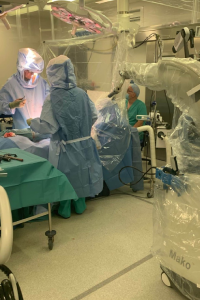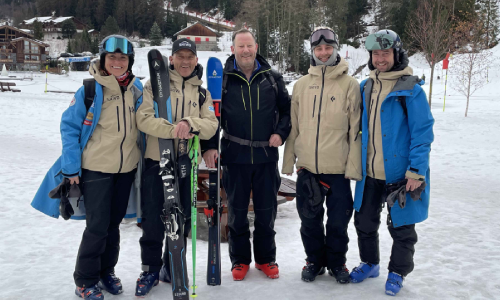New Knees for Skis in Record Time
A lifetime of sport takes its toll
Mr Eklof, 62, a retired software engineering business owner, had spent 40 years playing rugby and 50 years skiing for several weeks every year, which naturally took a toll on his knees. Over time, the wear and tear became increasingly difficult to manage, leading him to explore surgical options.
After struggling with knee pain for five or six years, Mr. Eklof tried various treatments, including knee bracing and injections. However, these temporary measures were not enough, and he ultimately opted for knee replacement surgery. Within two years, he had both knees replaced, experiencing significant improvements in mobility and quality of life.
A cutting-edge solution: robotic-assisted surgery
For his second knee replacement, Mr Eklof chose the minimally invasive Stryker Mako procedure at the Nuffield Health Vale Hospital. This advanced robotic-assisted technique not only provided a more precise implant placement but also led to a much quicker recovery.

Knee specialist at Nuffield Health’s Joint Replacement Centre of Excellence, Mr Andrew Miller, explains:
"Mr Eklof is a great example of how minimally invasive robotic surgery combined with early enhanced physiotherapy and a driven patient can lead to excellent outcomes. On July 19th, the Mako robot was used to assist in a lateral uni-compartmental knee replacement. This was the patient’s second knee replacement, and he made a very speedy recovery and return to skiing.”
Nuffield Health Vale Hospital has now performed over 350 Mako robotic joint replacements and is currently the only hospital in Wales offering this technology.
"Robotic-assisted joint replacements are associated with improved implant placement, less post-operative pain, shorter hospital stays, and quicker recovery than manual surgery. The Mako robot does not replace the surgeon but is an amazing tool that improves accuracy and safety, allowing the whole procedure to be performed with a 4mm burr through a very small incision," adds Mr Miller.
A swift recovery and return to the slopes

Just four months after his second knee replacement, Mr. Eklof successfully returned to skiing, a testament to both the effectiveness of the procedure and his dedication to recovery.
"I really struggled with my knees for five or six years before I underwent surgery. I tried various other options, including knee bracing and injections, but the knee replacements have been the answer," says Mr Eklof.
Last updated Wednesday 5 February 2025
First published on Wednesday 5 February 2025
